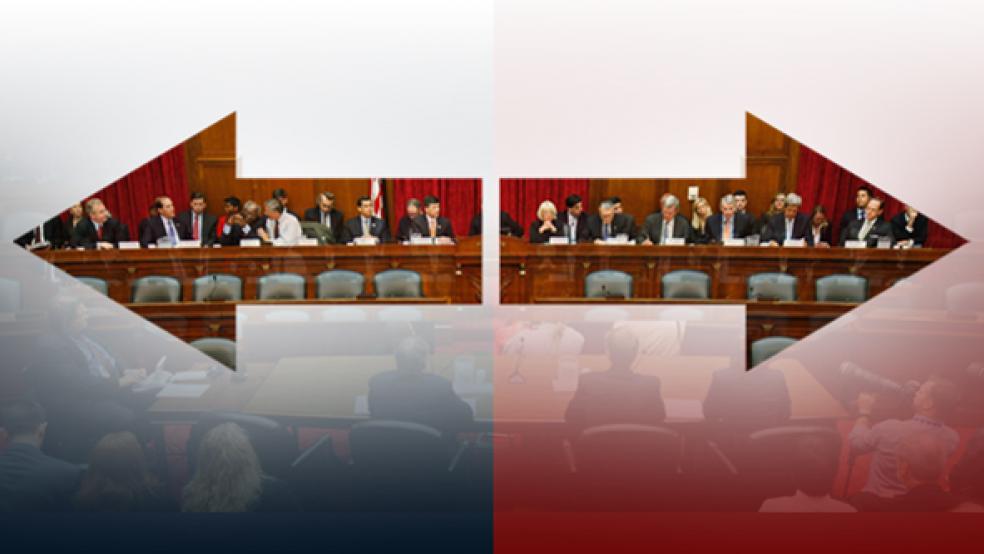For some conservatives, the failure of the Super Committee to reach agreement on at least $1.2 trillion of deficit reduction savings over 10 years is welcome news and underscores GOP solidarity in opposing increased taxes as part of the mix. “It was set up to seduce gullible Republicans into signing onto a 1990s-style budget deal comprised of real tax increases and phony spending cuts,” says Dan Mitchell, senior fellow at the libertarian CATO Institute. “It’s a 100 percent victory for taxpayers. There were no spending cuts available that were real.”
Mitchell said that the agreement between President Obama and Republican and Democratic congressional leaders last summer to create the Super Committee had one purpose: “to get the GOP off of the tax pledge.” Mitchell is referring to anti-tax lobbyist Grover Norquist who began soliciting signers for his no-tax-increase pledge in 1986 with the passage of the landmark Tax Reform Act. All six Republican members on the Super Committee who had signed the pledge sought to slash spending without raising taxes.
no Super Committee
can succeed with Grover
Norquist as its 13th member.”
Democrats slammed Norquist and his tax pledge for the failure of the Super Committee. “The bottom line is that no Super Committee can succeed with Grover Norquist as its 13th member,” panel member Sen. John Kerry said in a statement.
Norquist fired back. "For the congressmen and senators who signed the taxpayer protection pledge, they and the American people know the pledge is from them to the voters of their district and their state," he told CNN.
“We’re relieved that it didn’t become a super tax hiking committee,” said Dean Clancy, legislative counsel with Freedomworks. “This is a reoccurring pattern, raise taxes now and cut spending tomorrow. Tomorrow never seems to get here.” Clancy said the debt ceiling legislation passed last summer to avert a default on U.S. debt was a typical Washington exercise in kicking the can down the road. Internal divisions within the parties hampered talks. But ideological differences over taxes and entitlement cuts were at the core of the debate and ultimately lead to the panel’s impasse.
This is nothing new, according to former House Majority Leader Dick Armey, R-Tex. Armey said in an interview that the controversy dates back to the days of the late Arizona conservative senator Barry Goldwater, who predicted in 1976 that there would be epic political and ideological battles between the two parties over taxes and entitlement spending. He warned the American people, “We have come to a crossroads” and offered a doomsday prophecy in his book The Coming Breakpoint. Goldwater said that if the government is left to its own devices, “the glory that is America may go the way of the glory that was Rome.”
Armey, president of the Tea Party group Freedomworks, said he expected the panel to fail from its inception because it “was created in desperation to get the votes to raise the debt ceiling,” and it represents a microcosm of the larger problems plaguing the two parties. Democrats said they would only agree to savings from entitlement programs if Republicans would agree to tax hikes. Republicans insisted revenues would not be on the table.
Conservatives said that another problem that confronted the Super Committee was too high expectations. Some believed panel would address a handful of expiring measures and roll them into a final deal, including a payroll tax holiday, extending the unemployment benefits for the long-term unemployed and a 27 percent cut to the Medicare “doc fix”—which prevents doctors’ payments from being slashed.
Alison Fraser, director of economic policy studies at the conservative Heritage Foundation, said once the Super Committee “got loaded up with all of these extra mandates, it was really doomed to fail….Its mandate was big enough,” she said. “It failed because they were trying to do too much and they didn’t have enough time.”
Fraser says the failure was a missed opportunity for the country. “They had the opportunity to lay down some serious first steps to reforming entitlements and they couldn’t even do that,” she said.





